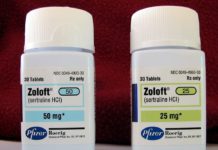Lithium
In this piece for Healing Journey, Anne O'Beirne briefly summarizes the history of the medical usage of lithium and describes the impact that the drug has...
Berlin Manifesto for Humane Psychiatry Released
Changing the mental health and psychosocial support system in Germany requires public debate about the ways our society should help and support people in mental crisis and with chronic mental health problems. We believe the driving force behind all help and support should be humanitarianism and respect for inalienable human rights.
Opioids May Cause Depression and Worsen Chronic Pain
“Converging lines of evidence now suggest that depression—a common comorbidity in the setting of chronic pain—may in some patients represent an unrecognized yet potentially reversible harm of opioid therapy.”
“B.C. Care Homes Provide Antidepressants Without Diagnoses”
New data reveals that the majority of care homes in British Columbia, Canada are giving out prescriptions for antidepressants and antipsychotics without a diagnosis....
“Risk of Off-Label Uses for Prescription Drugs”
The Wall Street Journal highlights a new study that found that off-label medications represent about 12% of drug prescriptions and are resulting in negative...
FDA-approved Ads Misinform Patients About Antipsychotics and Motor Dysfunction
Food and Drug Administration-approved information and public advertisements are misleading the public about the actual neurodegenerative risks from second-generation antipsychotics.
Very Slow Tapering Best For Antidepressant Withdrawal
A new article in Lancet Psychiatry finds that slower tapering of SSRIs is better for preventing antidepressant withdrawal effects.
“Drug Overdoses Propel Rise in Mortality Rates of Young Whites”
“The rising death rates for those young white adults, ages 25 to 34, make them the first generation since the Vietnam War years of the mid-1960s to experience higher death rates in early adulthood than the generation that preceded it,” the ‘Times reports.
Deprescribing: How to be on Less Medication for Healthier Aging
In this post for Better Health While Aging, Dr. Leslie Kernisan discusses the importance of making sure that older adults are taking the minimum amount...
Nine Rights Every Patient Should Demand
From The New York Times: Many medical centers, professional associations, and states have developed patients' bills of rights. It is time to develop a Financial Bill of...
Researchers Challenge Interpretation of Antidepressant Meta-analysis
Researchers question the overstated results of a large antidepressant meta-analysis and point to cultural pressures to turn to these drugs for a quick fix.
“For One Condition, the Drugs Came Before the Disorder”
An investigative report in the Milwaukee-Wisconsin Journal Sentinel explores the pharmaceutical industries involvement in the creation of the ‘mental illness’ known as Premenstrual Dysphoric Disorder...
Pentagon Study Links Prescription Stimulants to Military PTSD Risk
A new study suggests that service members who take stimulant medications to stay alert are five times more likely to suffer from post-traumatic stress disorder, the LA Times reports. “Those who had been prescribed multiple stimulants and the biggest supplies of the drugs were the most likely to have PTSD.”
Adderall Use Associated with Increased Risk of Psychosis
Twice as many teenagers with ADHD experienced severe psychosis when taking Adderall, as compared to Ritalin, according to a new study.
A Blow to STAT’s Credibility: Ghostwriting/PR Influence
From HealthNewsReview.org: STAT recently published an op-ed praising the role of drug company sales representatives. The physician listed as the author has now revealed that he did...
“California Courts Step Up Oversight of Psychotropic Medication Use in Foster Care”
The Mercury News reports that California’s judicial council is taking major steps to address the rampant use of psychiatric drugs in foster care. The...
With Great Health Data Comes Great Potential for Bias
From Pacific Standard: Technology is increasingly collecting and sharing data on individuals' mental and physical health, which is then converted into useable knowledge, such as recommendations about...
The “Shotgun Method” – A Story of Mental Health Crisis in Iceland
"Let's try the shotgun method," my psychiatrist said — meaning that you load the gun with a bunch of pellets and hope that one of them hits the target. I went through 16 different psychiatric medications in five years, and they were not the right choice for me.
Preventing Long-term Benzodiazepine Use
Researchers Identify risk factors for long-term benzodiazepine use to prevent harmful effects.
Rigorous Study Finds Antidepressants Worsen Long-Term Outcomes
A new study conducted by Jeffrey Vittengl at Truman University has found that taking antidepressant medications resulted in more severe depression symptoms after nine years.
“Woman Can Sue Study Sponsor for Suicide Try”
A woman in Texas attempted suicide while in the active group of a clinical trial for smoking-cassation drugs Chantix and Zyban, both known to...
How do we Know if a Drug Actually Works?
From Scientific American: The effectiveness of a particular medical treatment is often highly subjective and dependent on each individual's definition of the term "effective." Many...
Majority of Pediatric Antidepressant Industry Trials Considered Low Quality
Meta-analyses including studies that detail these trials could be presenting misleading information.
Time for Full Transparency on Pharmaceutical Money
From The Toronto Star: Ontario law should require pharmaceutical companies to not only disclose payments to physicians but also make public their contributions to all...
New Medications Fail to Show Efficacy for Alzheimer’s Disease
Three phase III clinical trials assessing the efficacy of Lundbeck’s investigational drug idalopirdine for Alzheimer’s disease have failed



























